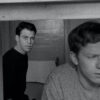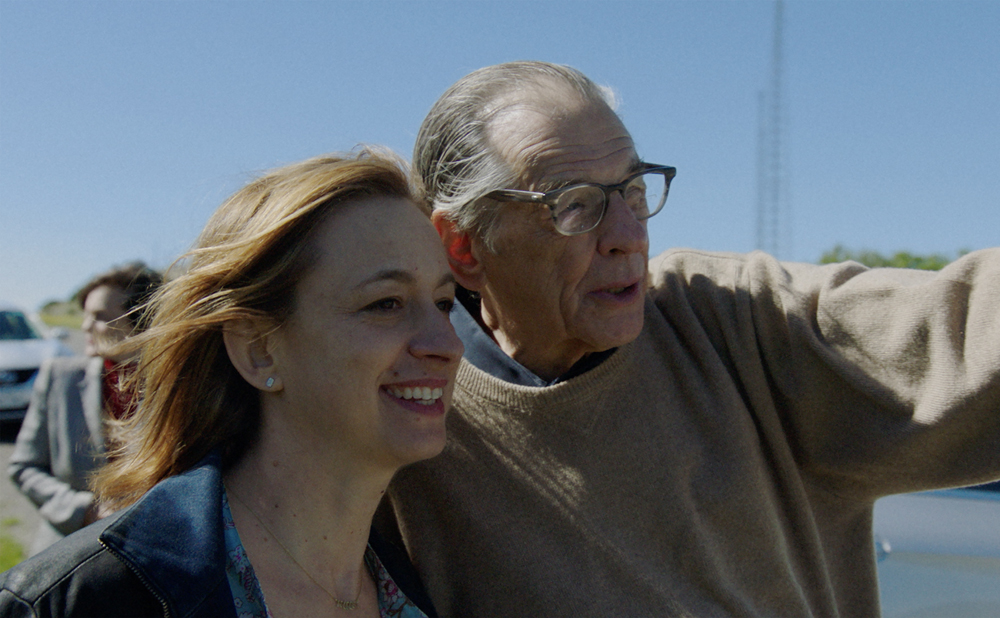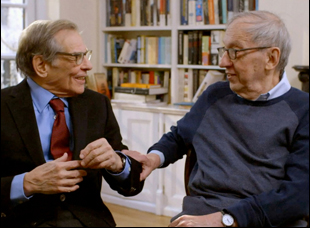Readers have long known the sensation of hanging on Robert Caro’s every word, craving even more from the historian’s monumental tomes on Robert Moses (“The Power Broker”) and Lyndon B. Johnson than their put-upon spines would allow. However, when Lizzie Gottlieb embarked on making a documentary about the author and his renowned editor — her father Robert Gottlieb — they seem hold a greater premium when she could never be sure if either of them would talk about a process that they held so close to the vest.
“My producing partners and I kept thinking to ourselves, “How do you make a story about two very old men who spend their time sitting alone in rooms, thinking about word choice an exciting film that people are going to want to see?” said Gottlieb, who can finally take some comfort after coaxing insights out of the two for one of the year’s must-see films with “Turn Every Page.” “A lot of how I thought about how to interview them played into that and [when] Caro invited us to come to Texas when he was on his book tour for his book ‘Working’ and he’s like, ‘I think we need to go out to Johnson City,’ we went out there for the day and it was pretty extraordinary.”
Caro’s invitation would turn out to be far more than opening the doors to President Johnson’s childhood home, but to the floodgates of memories of how he came to so vividly evoke the details of his life when embedding in Texas Hill Country, going so far as to describe the texture of the grass in his notes and it isn’t an embellishment on Gottlieb’s part to subtitle the riveting doc that emerges as “The Adventures of Robert Caro and Robert Gottlieb” when in spite of the fact that Caro keeps his head down for much of the film, working on a fifth and final volume of the LBJ biography as Gottlieb awaits his pages, the film becomes a lively travelogue through America in the 20th century when the two literary titans have made such an impact on how that history is recorded as they’ve made some of their own.
Even with the family connection, Gottlieb was hardly afforded an all-access pass at the start of her own process, cheekily noting upfront in the film how she was asked to abide by some ground rules, such as interviewing the two men separately and never recording any conversations they may have about any works in progress. However, just as one can see the warmth between the writer and editor even as they maintain a healthy distance from one another, considering each other as colleagues more than friends so that no sentimentality enters their arguments about what’s best for the book at hand, a tender portrait blossoms nonetheless when one is allowed to share their passion for the power of the written word, finding the humor in quarreling over commas that seems at once entirely foreign in its ferocity and yet as familiar as any minor domestic squabble where both sides dig in their heels.
Showing the same lack of pretense as its towering subjects, “Turn Every Page” is able to relate their seemingly superhuman feats on a personal scale, whether it’s Robert Gottlieb speaking casually about working with Toni Morrison and Joseph Heller while roaming the aisles of a bookstore with his grandson or sitting in on Caro’s rigid routine of indexing his notes that has powered him through the nearly half-century project of the Johnson bio, and director Gottlieb’s own dedication over seven years yields stories from the two men’s lives as rich and fascinating as any they’ve worked on in their professional endeavors. On the eve of the film’s release across the country, Gottlieb spoke about how she channeled the electricity of Caro and Robert Gottlieb’s collaboration into such a captivating film, the collaborations behind the scenes that allowed her to take on such a long-haul project and now having this history to hold onto.
Over the years I thought maybe I should make a movie about my father, but I couldn’t really find a way in that felt like anything other than “here’s an ode to my terrific dad,” which I don’t think is a movie. And I reluctantly went to this [ceremony for an] award my dad was being given and Bob Caro gave the speech. He talked about their relationship and how complicated it is and really, the next day I was walking with in Prospect Park with my friend Joanne Nerenberg and on the walk, I was like, “I just had an idea. I think I need to make this movie.” [Joanne] has a film background and we started talking about it and she was incredibly supportive and came onboard immediately as a collaborator and producer.
Then I ran into Mott [Hupfel, a cinematographer] at a friend’s dinner party and I told him the idea and he said, “I’d shoot that.” And I was scared to ask him because Mott shoots a lot of big movies, but I finally did and he said, “You could never afford me. I’ll shoot it for free.” That was this incredible superpower that we suddenly had that we could start making this movie, just us on a shoestring and it allowed us to get far enough to convince ourselves and then other people that maybe it could work.
It becomes an entertaining part of the story, but when your two subjects are both so protective of their process, was it difficult to find an entry point for yourself?
There were a few levels of difficulty. One was convincing them it was a good idea because they were both adamantly opposed to it. They’re private men and they’re not of the Instagram generation, you know? [laughs] They both feel very strongly that the work is what’s important and the work should be forward facing in the world and not themselves, so obviously I respect that enormously, but I felt that I wanted to get into that room and into that relationship to understand something about how books get made — and in particular, these books and this particular relationship — and I thought other people might too.
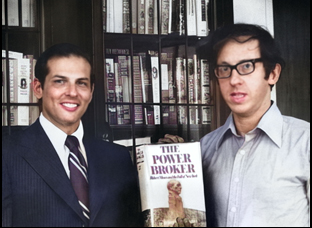
Were you getting whiplash from interviewing one of them, hearing one side of a story, and then the other?
I really loved that part. As you see in the film, Bob Caro refused to be filmed in the same room as my father, which was hilarious and a little maddening and endearing and [also] an intriguing challenge as a filmmaker, and I felt like if I could ask the right questions, I could make it feel like they were having an intense back-and-forth, so it was actually really fun to go back and forth and bring them something the other one had said and try to weave it together like a conversation. In the editing process, it was challenging to figure out how much can you go down the road with one Bob before you have to hand the baton off to the other Bob to make it feel like a balanced story.
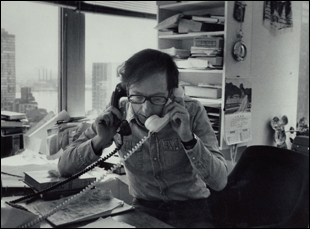
The one I was most excited to get to cut together was the story of them each deciding separately he should write about Lyndon Johnson after he wrote about [Robert] Moses. If you’ve seen the film, you know that Caro is under contract to write about Fiorello LaGuardia [after “The Power Broker”] and they both come to this notion that he should write about Johnson and it’s such a dramatic moment [where] they’re so in sync that they have the same thought on something really profound, so I love the similarities and discrepancies in the way they told the story.
I imagine there was as much good material left on the cutting room floor as one of these LBJ volumes. Did it engender any sympathy for what your father went through, having to trim this down?
It’s so true. Over and over again in the movie, we felt like we were not in the tracks of these two guys — and I’m not comparing what we did to Caro, but there were so many times where we thought, “Oh, he would pursue this for seven years. It’s okay we pursue this for seven years.” [Or] “We’ve got to cut this down and it’s painful and there are things we have to leave out,” but there were all these sort of little words of wisdom in the film itself that were encouraging us and guiding us in terms of how to do this.
You can’t rush a film about Robert Caro, right? [laughs] And I did not know if this would work, all the way along. It doesn’t seem cinematic. It doesn’t seem dramatic. What I was [holding onto] was this slightly crazed internal feeling of I think this is going to work and I was very lucky in my collaborators that everyone felt we were going to make this film until I had the film I wanted to make and what an incredible gift. There was a really amazing moment along the way where I said to Bob Caro, “I’m so sorry that this is taking so long.” And he paused and he closed his eyes in that quite incredible way that he does — where you feel he’s going deep inside and then he opens them again — and he looked at me and he’s like, “Lizzie, it’s not about how long it takes to make. It’s about how long it will endure.” And it felt like the voice of God was speaking to me in this unbelievably generous way. It was inspiring and we took the time we needed.
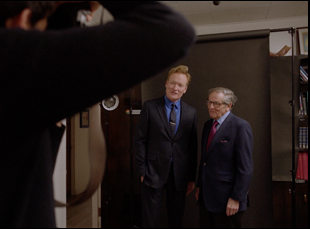
Yeah, I really didn’t want to throw random famous people in this movie, so I thought a lot about who we should have read the text and I thought of Ethan for three reasons – one was that he’s a New Yorker, but he’s also a Texan, so it felt like he was connected in some way to both “The Power Broker” and the Johnson books. Then I mentioned him to Bob Caro, who said, “I love Ethan Hawke. One of my favorite movies is ‘Before Sunrise.’” And Ethan is also a friend I’ve known for a long time, so I knew I could just call him and he agreed to do it. He’s so great and I think he does such a great job — he’s a Caro fan, which I thought was important to show in the movie — and we played with how much you should see him versus hear him.
From what I understand, it was Caro seeing one of your earlier movies that was part of convincing him to do this – it seems like he’s got a real appreciation of movies.
It’s true, and he does seem to really, really like [this] movie. I’m not sure he thought he was going to and I think it took him quite a while to open up and trust that we were doing something that he would respond to, but that was very gratifying to watch. I tried to fit that into the film as well, the feeling that he starts out a little closed and over the seven years, he comes to open up and soften and maybe like me more. That was an important piece to fit into the film and one of the reasons it also had to take so long because trust develops over time.
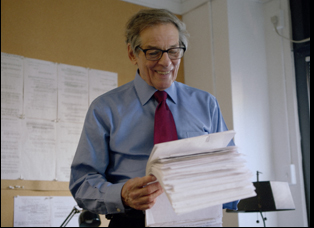
That is a special part of it. We did an event at the 92nd Street Y [recently] and just to be there on stage with my dad, who’s 91 years old, and my mom was there, it’s very emotional and very meaningful. It feels much more profound than making a film about something else. To have my dad be able to participate and see it and be a part of it means so much to me.
“Turn Every Page: The Adventures of Robert Caro and Robert Gottlieb” opens on December 30th in New York at Film Forum and Los Angeles at the Laemmle Royal before expanding. Click here to find a theater near you.
